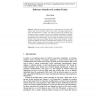Free Online Productivity Tools
i2Speak
i2Symbol
i2OCR
iTex2Img
iWeb2Print
iWeb2Shot
i2Type
iPdf2Split
iPdf2Merge
i2Bopomofo
i2Arabic
i2Style
i2Image
i2PDF
iLatex2Rtf
Sci2ools
105
click to vote
PERVASIVE
2007
Springer
2007
Springer
Inference Attacks on Location Tracks
Although the privacy threats and countermeasures associated with location data are well known, there has not been a thorough experiment to assess the effectiveness of either. We examine location data gathered from volunteer subjects to quantify how well four different algorithms can identify the subjects’ home locations and then their identities using a freely available, programmable Web search engine. Our procedure can identify at least a small fraction of the subjects and a larger fraction of their home addresses. We then apply three different obscuration countermeasures designed to foil the privacy attacks: spatial cloaking, noise, and rounding. We show how much obscuration is necessary to maintain the privacy of all the subjects.
Related Content
| Added | 09 Jun 2010 |
| Updated | 09 Jun 2010 |
| Type | Conference |
| Year | 2007 |
| Where | PERVASIVE |
| Authors | John Krumm |
Comments (0)

